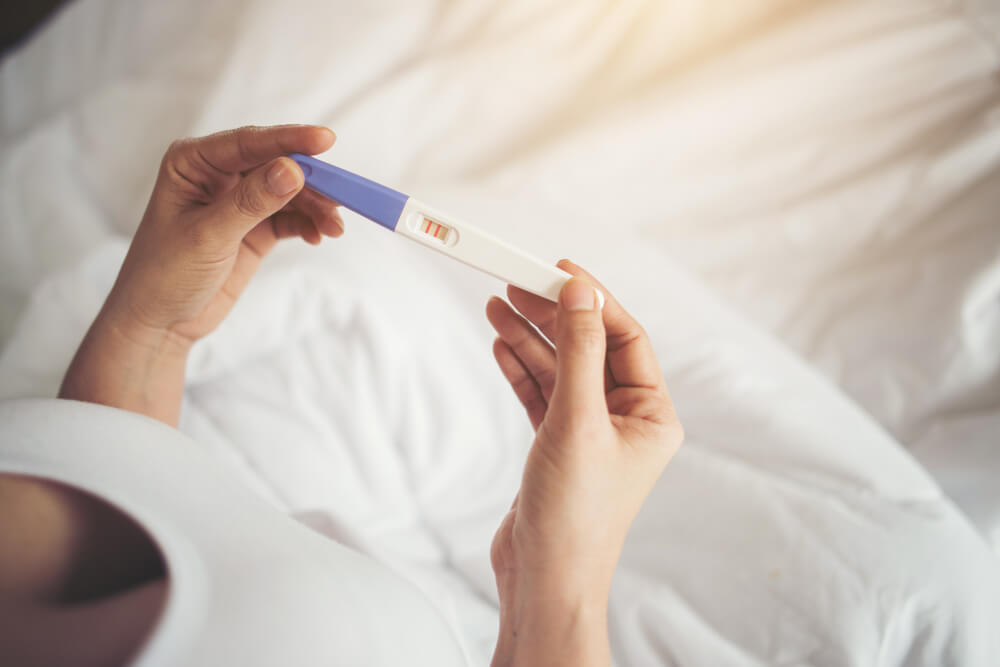Home Pregnancy Test: Two Lines Mean Bun in the Oven? Decoding the Mystery
Staring at a pregnancy test with a mix of anticipation and trepidation? You’re not alone. Those little sticks hold immense power, revealing a life-altering truth in a matter of minutes. But before you start planning the nursery, let’s decode the mystery behind home pregnancy tests and understand what those lines truly mean.

Decoding the Lines: Understanding Pregnancy Test Results
A home pregnancy test detects the presence of a hormone called human chorionic gonadotropin (hCG) in your urine. This hormone is produced by the developing embryo shortly after implantation.
Two Lines: Congratulations! This is generally considered a positive result. The test strip contains two lines: a control line (always appears) and a test line (appears if hCG is present). Two visible lines indicate the presence of hCG, suggesting pregnancy.
One Line: This usually signifies a negative result. The control line appears, but the test line remains absent, indicating no detectable hCG levels.
Faint Lines: Faint lines can be a cause for confusion. Some tests might show a faint pink line alongside the control line. This could be an early pregnancy, where hCG levels are still low. However, it’s important to retest with a new pregnancy test in a few days (ideally with first morning urine) for a clearer result. Evaporation lines, which appear due to urine drying on the test, can also mimic faint lines. Double-check the instructions and ensure you read the results within the specified timeframe.
When Should I Take a Test?
Most home pregnancy tests are designed to be used after you’ve missed your expected period. The longer you wait after your missed period, the more accurate the test will be. However, some highly sensitive tests claim to detect pregnancy as early as a few days before your missed period.
Accuracy Matters: How Reliable Are Home Pregnancy Tests?
Home pregnancy tests are incredibly reliable when used correctly. Studies show they boast an accuracy rate of over 99% when used according to the instructions and with first-morning urine. However, factors like following the instructions precisely, testing too early, or certain medications can affect the accuracy.
Beyond the Test: What to Do Next After a Positive Result
Scheduling a Doctor’s Appointment: A positive home pregnancy test is a good indicator, but it’s not a definitive diagnosis. A doctor’s appointment is crucial to confirm the pregnancy, determine its location (uterine or ectopic), and discuss your prenatal care options.
Early Pregnancy Do’s and Don’ts:

- Do: Start taking prenatal vitamins with folic acid.
- Do: Schedule a prenatal appointment.
- Do: Eat a healthy, balanced diet.
- Do: Stay hydrated by drinking plenty of water.
- Don’t: Smoke, drink alcohol, or use recreational drugs.
- Don’t: Make drastic changes to your diet without consulting a doctor.
- Don’t: Hesitate to ask questions about your health and pregnancy.
Can Home Pregnancy Tests Be Wrong?
While highly reliable, there’s always a chance of a false positive or negative result. Here’s what you need to know:
- False Positive: This is uncommon but can occur due to a recent pregnancy loss (chemical pregnancy), certain medications, or a rare medical condition.
- False Negative: Testing too early, using diluted urine, or following improper test procedures can lead to a false negative.
Factors Affecting Test Accuracy:
- Testing Too Early: hCG levels rise steadily after implantation. Testing too early may not detect sufficient levels for a positive result.
- Improper Test Administration: Not following the instructions carefully, like not holding the test stick in the urine stream for the recommended time, can affect accuracy.
- Expired Tests: Expired tests may not work correctly. Always check the expiration date before using.
- Certain Medications: Some medications can interfere with the test results. Consult your doctor if you’re unsure.
When to See a Doctor After a Home Pregnancy Test
- Positive Result: Schedule a doctor’s appointment to confirm the pregnancy, discuss prenatal care, and address any concerns you might have.
- Negative Result: If you miss multiple periods or suspect you might be pregnant, consult your doctor for further evaluation.
- Uncertain Results: If you’re unsure about the results, especially with faint lines, repeat the test with a new test in a few days or schedule a doctor’s appointment.
Preparing for Your First Prenatal Appointment
Your first prenatal appointment is an exciting step. Here’s what you can do to prepare:
- Gather Information: Make a list of questions and concerns you want to discuss with your doctor.
